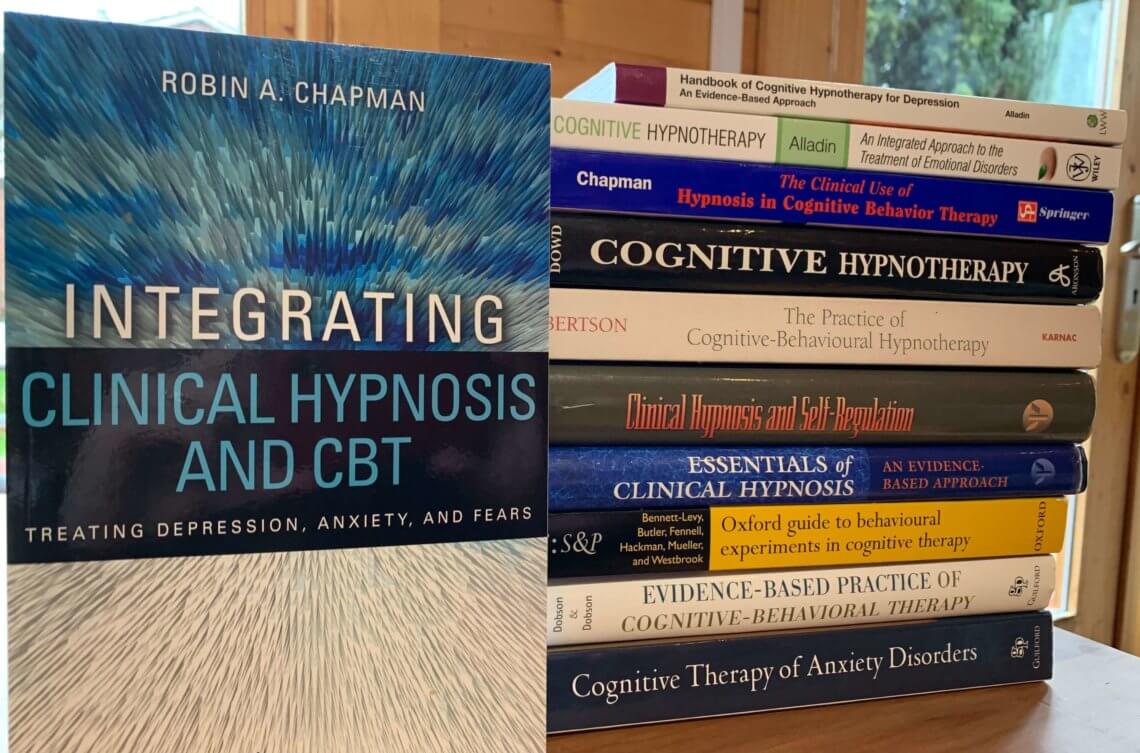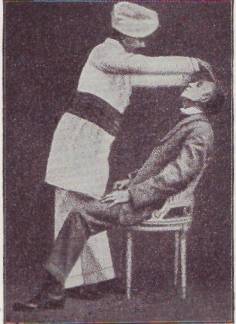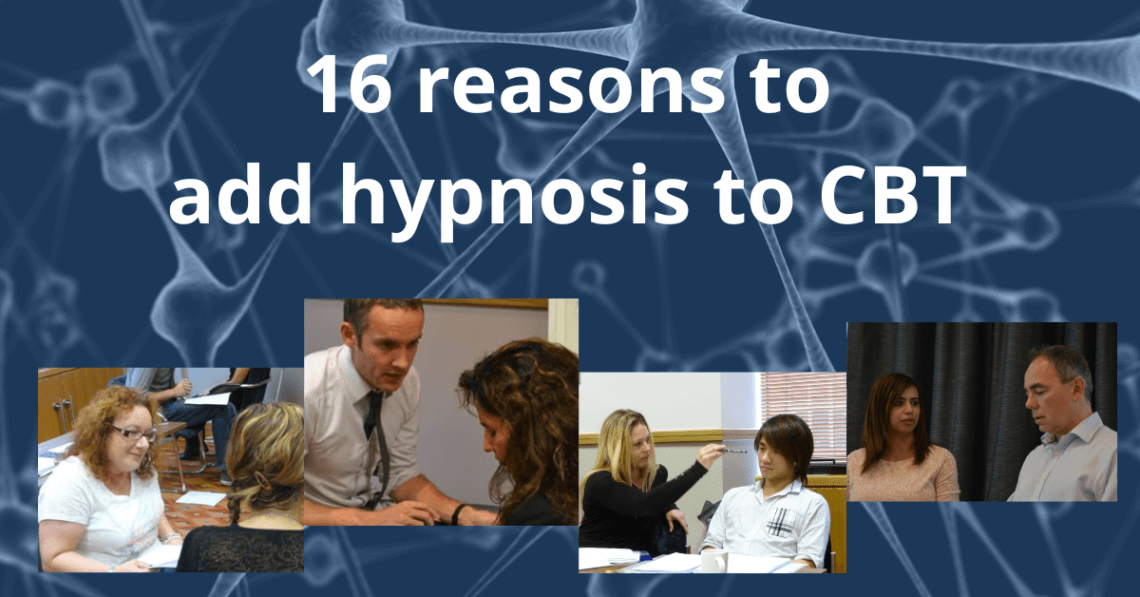- Last Updated
- Posted by
- Hypnotherapy

Why combine Hypnosis and CBT?
There are a number of strong reasons to combine hypnosis with CBT: improvement in therapy outcomes, similar procedures (imagery, self talk) and strong theoretical connections (especially between a modern non-trance model of hypnosis and CBT).
In a moment I'm going to look at 16 reasons to combine hypnosis with CBT – but first of all let's take a quick look at the historical connection.
Is this addition of hypnosis to CBT a 21st century thing?
When did it first start?
The Historical Connection…
“Hypnosis and cognitive behavioural psychotherapy (CBT) are well suited to each other because the historical connection between them and their procedural similarities….. The use of hypnosis in cognitive behavioural therapy is as old as behavior therapy itself… Cognitive and behavioural therapies are especially compatible with the cognitive behavioural approach to hypnosis”
– Kirsch, Capofens et al, Clinical Hypnosis and Self Regulation: Cognitive Behavioural Perspectives

Most people are surprised to learn that hypnotherapy was the original psychotherapy (prior to Freud)!
Then they're even more surprised to learn that the first behaviour therapists (really the first “science-based” psychotherapists) made extensive use of hypnosis.
Those early behaviour therapists who paved the way for modern CBT included: Joseph Wolpe with Systematic Desensisation, Andrew Salter with Assertiveness Training and Self Hypnosis training, and Arnold Lazarus with Multi-Modal Therapy.
However, besides the historical connections, there are a large number of key benefits that come from combining CBT with hypnosis.

16 Reasons to Combine CBT with Hypnosis
- Adding hypnosis to CBT seems to improve outcomes compared to CBT along (watch for our upcoming article on this!). A review of 18 studies that compared CBT with CBT+Hypnosis showed that 70% of people would benefit from adding hypnosis to the CBT approach.
- Hypnosis can produce profound behavioural, emotional, cognitive and physiological changes that can shorten treatment time. Clients can experience profound shifts in their emotions, thinking, physiology and behaviour through hypnosis, and this leads them to conclude “my experience could be different”. Clients become open to the possibility of change (the nurturing of hope) and begin to believe that they really can change.
Moreover the ability to deeply shift the client's experience – allows for a vastly increased range of experience in the therapy room; while deep in hypnosis and imagining being in a challenging situation we can lead deep shifts in aspects of the client's experience – perhaps being profoundly relaxed or becoming highly energised and proactive or a deep shift in confidence or becoming calm and accepting. - Taking clients into a positive hypnosis experience can help build the therapeutic alliance (working alliance). To allow oneself to be lead into hypnosis, to close one's eyes and focus and follow the voice and ideas presented by the therapist, is a moment where the client hands over to the therapist. A moment that can deeply increase the trust the client has in the therapist. Good hypnosis requires a real collaboration between therapist and client, and also is a very special, intimate communication between therapist and client.
- Heightened expectation to treatment due to perceived “power of hypnosis” – essentially a powerful placebo effect! If you ask the question “In addition to CBT I can also use hypnosis and teach you self-hypnosis, do you think that would help?” If the answer is yes – then it is nearly negligent not to use hypnosis! The client has just stated that hypnosis will improve the outcome of the therapy – due to the power of expectation this will become a self-fulfilling prophecy. The placebo response is very much due to expectation – we get well because we expect to get well. Hypnosis is, in many ways, a profound non-deceptive placebo. We ask the client to imagine the improvements they would like in their life
- Hypnosis is capable of inducing very deep relaxation which is central to some CBT treatments. From phobia treatments to helping with Generalised Anxiety Disorder to helping clients cope with stress or problem solve – or simply to rest and heal better – relaxation is a key component of each of these treatment approaches. Moreover it is easy to create cues or triggers in hypnosis which then allow clients to access the deep relaxed feeling in quick and easy ways throughout the day and especially in challenging situations.
- Hypnosis can facilitate benign detachment (e.g. from pain). One of the experiences we can create in hypnosis is that of becoming very detached, calm and observing about our experience. This experience in hypnosis not only becomes a relief from the pain but also becomes a skill the client can transfer into their daily life.
- Learn hypnosis and we can learn it’s opposite, “De-Hypnosis”, which resembles distancing or cognitive defusion in CBT. If clients learn how to do self-hypnosis (how to really focus their attention on an idea and experience it as true) – then we can teach them the reverse process of de-hypnosis: how to step back and observe thoughts and as just arbitrary thoughts. This, of course, is very similar to the skill of mindfulness.
- Hypnosis increases vividness of mental imagery and imaginal absorption (“as-if-real” imagining). The psychologist Ted Sarbin called hypnosis “believed-in-imaginings” – we are using our imagination in a special way where we choose to belief the imaginary experience is true, we do this by adopting the “imagining as-if-real”. This creates very vivid experience and in a way fools our brain into thinking that the hypnotic experience (imagination) is real. The client can have experiences in hypnosis that are very much life real life experience, creating new responses, new conditioning, new memories that will influence and “win out” against the old responses and memories that come up for them in challenging situations. So hypnosis can be a sort of “virtual reality simulator” where, in their imagination but imagining “as-if-real”, the client can experience coping and mastering the difficult situations in the their life.
- To be continued….(in Part 2)

